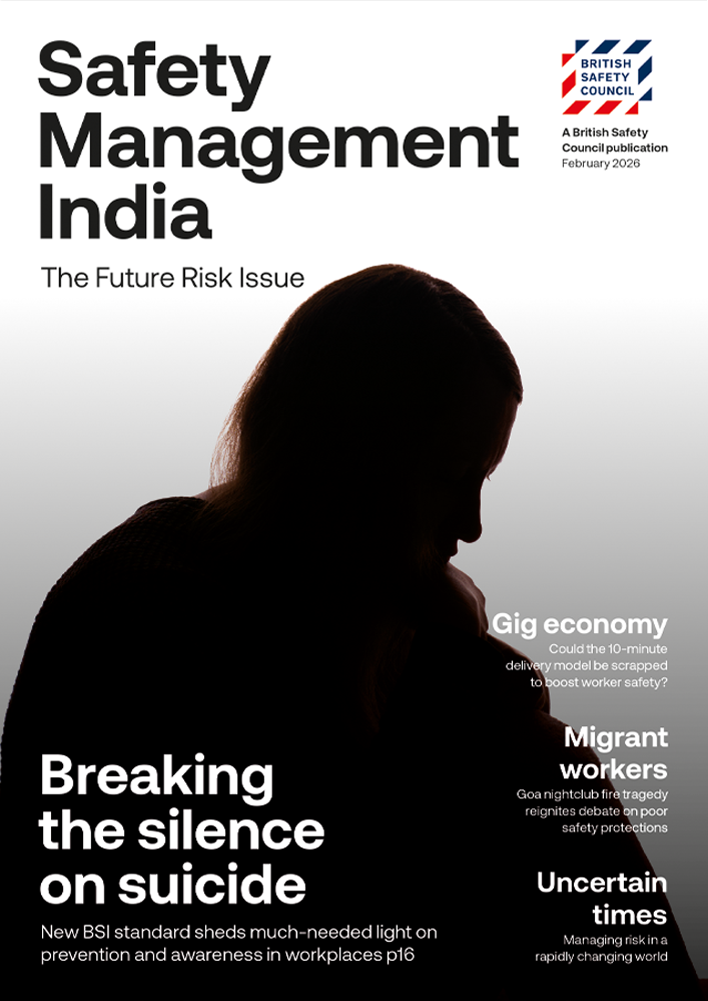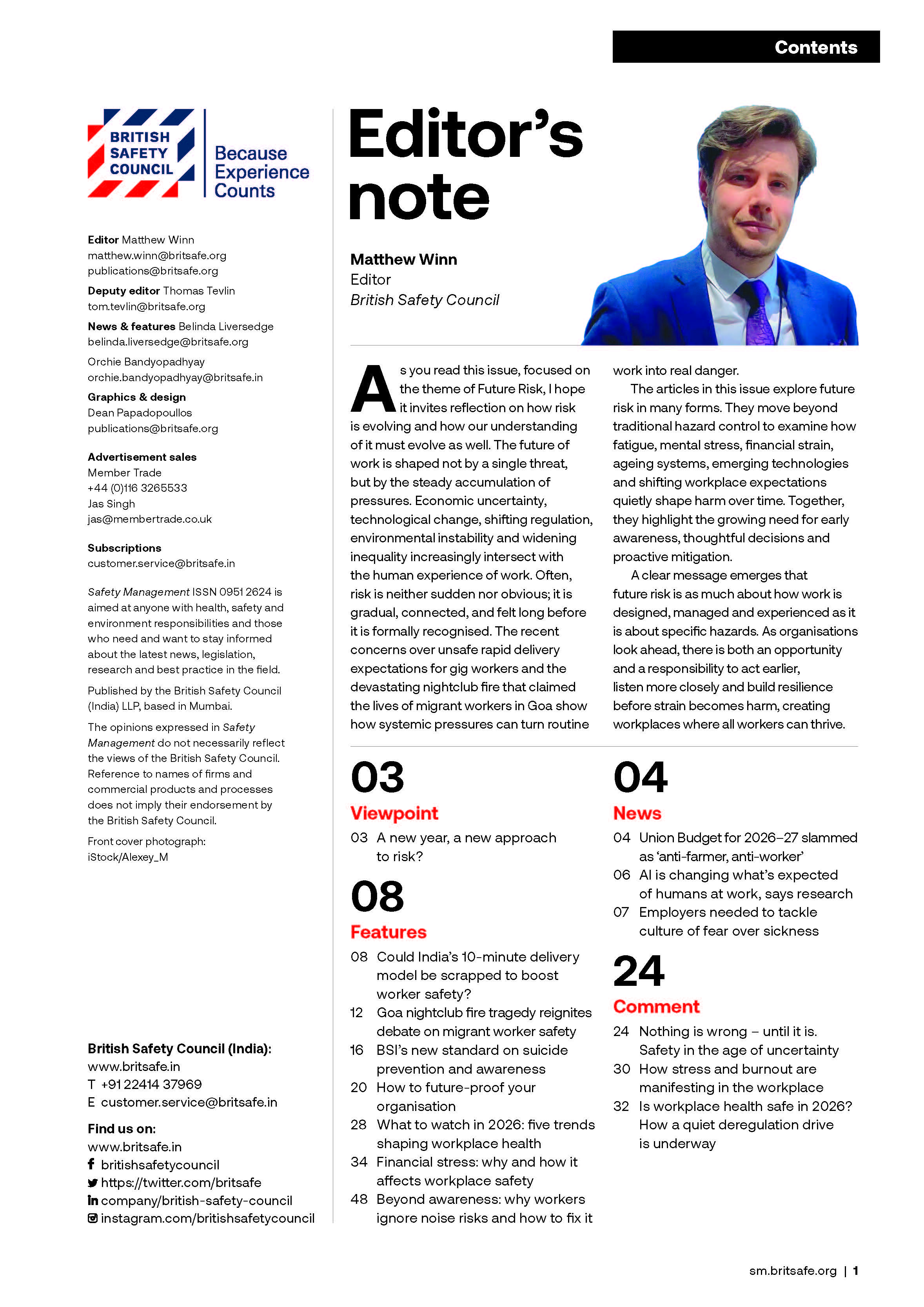India's startup businesses are celebrated as wealth and employment generators, but there are reports some are struggling to provide and maintain a healthy workplace culture, putting employee wellbeing at risk. In the first of a two-part article, we examine the efforts made by startups to provide a safe and healthy working environment, and the effectiveness of their approaches to date.
Features
India’s startup boom: how are these businesses performing on employee wellbeing?
India is in the midst of an extraordinary startup boom. The country has more than 100 ‘unicorns’ – privately held startup companies worth in excess of $1bn – encompassing sectors such as food delivery, online services and financial technology, or ‘fintech’. By injecting vitality and creativity into established industries, embracing new ideas, creating new markets and driving job creation, these new businesses seek to solve some of society’s biggest challenges and to offer new and innovative business models, products and services.
India is currently home to 157,066 registered startups, and reports suggest a record number of new startups have been launched nationwide in recent times. This incredible growth means the country’s startup ecosystem is now valued at over $450 billion. In fact, according to the Union Government’s Press Information Bureau (PIB), India has emerged as one of the most vibrant startup ecosystems globally and is currently ranked as the world’s third-largest startup hub. From fintech disruptors to e-commerce giants; food and beverage innovators to biotech pioneers, India’s booming startup ecosystem is as diverse as it is dynamic.

However, this boom is not just changing boardrooms; it is reshaping daily life. For example, ‘quick commerce’ in the shape of home delivery and ‘delivered in your home’ services have exploded in recent years in India, as residents and businesses seek to avoid unnecessary journeys on traffic-clogged streets to obtain and access a variety of goods and services. As a result, it is now commonplace for Indians to have everything from pizzas to books; strawberries to mobile phones; delivered to their doors – often in under 10 minutes.
In fact, a joint report by the consultancy firm Bain and e-commerce giant Flipkart showed India’s quick commerce sector accounted for over two-thirds of all e-grocery orders in 2024, and the quick commerce sector’s share of the e-grocery market increased approximately five-fold since 2022 to $6–7 billion in 2024.
The report also predicted that quick commerce is expected to grow at over 40 per cent annually up to 2030, fuelled by expansion across categories, geographies and customer segments.
So, why is quick commerce expanding so rapidly and successfully in India compared to many other countries? According to the Bain/Flipkart report, high population density, lower labour costs and the use of ‘dark’ stores (mini warehouses optimised with the necessary data, infrastructure and technology to serve the neighbourhood’s consumers in the most effective and efficient way) to optimise last-mile delivery, have worked in the country’s advantage.
Internal cultures ‘sometimes lagging behind’
However, although startups are revolutionising how Indians shop, travel and pay, their internal cultures often lag behind the latest best practice for supporting employee wellbeing.
Commentators say that while capital, mentorship, scalability and market access are obviously key factors in determining whether a startup merely survives or truly succeeds, one of the most decisive factors is the organisation’s workplace culture. Experts in the employment and start-up fields argue that, while a solid business strategy may help a startup attract crucial investment from those looking to gain a share of equity in the successful businesses of the future, as the saying goes, “culture eats strategy for breakfast”.
In fact, research shows that companies with strong cultures experience four times stronger revenue growth compared to those without. On the other hand, toxic workplaces lead to lower productivity, high staff turnover and disengaged employees, research has shown.
Commentators argue that hugely global businesses that began as startups – such as Google – illustrate the business benefits of a positive and supportive workplace culture. They argue Google fully understands that a strong company culture is the foundation upon which the company’s success is built.
Google’s company culture is based on the belief that happy and engaged employees are more likely to go above and beyond in their work. By paying close attention to the wellbeing and satisfaction of its employees, Google has managed not only to attract and retain top talent, but also increased productivity and overall business performance,
say commentators.
Employment relations and business experts say that, adopting approaches such as flat hierarchies (an organisational structure where there are few or no levels of middle management between staff and leadership, resulting in a short chain of command and more autonomy for employees), flexibility and autonomy for employees, innovation and experimentation, continuous learning for staff, measures to support an appropriate work-life balance, diversity and inclusion at work, and transparency and communication, has enabled Google to attract top talent and sustain innovation.
Long working hours
However, although the number and market reach of startups in India have expanded rapidly over the past decade, attracting record investment, the workplace culture in startups remains a sticking point.
Commentators say that long hours, job insecurity, tight timelines, limited resources, shifting priorities, new responsibilities (sometimes without clear guidance), ambiguity and frequent changes to an organisation’s strategic direction are all factors with the potential to negatively impact workplace culture and employee wellbeing.
There are reports of startups asking employees to put in extra hours to meet deadlines and achieve ambitious company goals, while also expecting staff to have a high level of self-direction. Although some employees may find these pressures and work demands exhilarating, many report feeling ‘lost’ in what they perceive as ‘chaotic’, ‘messy’ and ‘unorganised’ work environments, often associated with startups.
This raises a critical question familiar to occupational health and safety experts worldwide: can any company afford to ignore employee wellbeing and still expect to succeed? Employment and business experts say that, while in the past employee wellbeing may have been considered to be a ‘nice-to-have’ feature of working life, in today’s competitive world, supporting staff wellbeing is a strategic must. For millennials and Gen Z, their next career move hinges not just on the opportunity to earn a larger salary, learn a new skill or reduce their commuting time, but also on purpose, balance, flexibility and whether the business genuinely cares for – and supports – the wellbeing of its staff.
Improved productivity
Studies consistently show that proactive, organised employee wellness programmes can lead to improved productivity, higher engagement and increased morale – all of which can also boost an organisation’s bottom line.
A survey by Blind, an anonymous professional community app, in March 2025, found that overwork and burnout in India’s IT sector is common. Conducted between 12–19 March 2025 among 1,450 verified IT professionals, the survey revealed that 72 per cent of respondents routinely work more than 48 hours a week. Even more alarmingly, one in four reported working 70 or more hours a week, contributing to a reported ‘burnout rate’ of 83 per cent.
High burnout rates ‘being reported’
In general, high-pressure sectors such as technology, finance and healthcare are witnessing reported employee ‘burnout’ rates of more than 50 per cent, according to some surveys.
Commentators say that high burnout rates in turn lead to higher staff turnover, reduced productivity and higher healthcare costs for businesses that offer health insurance as staff seek support for work-related mental health problems like stress and anxiety. And the damage doesn’t stop at the bottom line. Workplace morale, team dynamics and organisational culture all decline and suffer, say employment relations and workplace wellbeing experts. When burnout becomes ‘business as usual’ within a company, staff retention becomes nearly impossible, and so does long-term growth, say business commentators.
One recent viral post on Reddit, the online discussion platform and app, captured this reality. The post, titled ‘I cried on Google Meet in front of the tech lead. I do not know how to face it now’, described how the co-founder of a startup had deliberately mistreated staff on multiple occasions. The anonymous poster, who said they were a new ‘front-end’ software developer working remotely for a startup with just two employees and three founders, exposed the toxic culture at the startup in question, garnering numerous comments, views and re-shares by other Reddit users.
In the post, the employee accused one of the company’s co-founders, who also acts as the tech lead, of repeated verbal abuse and public humiliation. The tech lead’s behaviour reportedly reached breaking point when the employee could broke down and started crying during a Google Meet for work purposes.
As well as feeling humiliated by the actions of the startup’s tech lead, the Redditor revealed the harsh realities of life at the business, where employees reportedly are required to work long shifts of up to 12–15 hours without proper guidance or training.
The post quickly garnered support from the Reddit community, with users pointing out that poor working culture is a systemic issue plaguing a number of Indian startups.
One user wrote: “Only two employees and three founders? Leave this LALA company ASAP! Indian startups like these are full of egoistic founders. It’s better to join TCS or Infosys or even do freelancing.”
Another user advised the employee to resign, calling out the exploitative culture prevalent in some startups:
“Front-end and UI/UX designers are the most exploited in Indian startups. Mostly Indian ones. You’ll burn out to the level that you’d want to quit immediately and run away.”
Occupational phenomenon
These kinds of stories highlight why in 2019, the World Health Organization officially recognised burnout as an occupational phenomenon. “Burnout is a syndrome conceptualised as resulting from chronic workplace stress that has not been successfully managed,” the WHO said. “Burnout refers specifically to phenomena in the occupational context and should not be applied to describe experiences in other areas of life.”
Globally, trials of shorter working weeks have shown promising results in better supporting employee wellbeing than approaches that require staff to work long hours. In 2019, Microsoft Japan tested a four-day working week and reported that employees were happier, meetings were more efficient and there was a 40 per cent boost in productivity.
Progressive Indian startups
Inspired by the results of these different approaches to working life and workplace culture, a number of progressive Indian startups are rewriting the script by embracing modern employee wellbeing strategies. Flexible working arrangements, mandatory time-off policies, generous health insurance schemes for staff, mental health counselling and offering employee stock option plans (ESOPs) are approaches that are becoming more common among the ‘top tier’ of progressive startups.
For example, Razorpay, an online financial transaction service for businesses, has redefined the health insurance coverage it offers to its employees. The fintech startup’s Employee Health Insurance Policy offers health insurance benefits for all full-time team members and their families. The health insurance policy allows staff to customise their health insurance benefits, extends benefits to live-in or LGBTQIA+ partners and provides health insurance cover for an employee’s siblings, the last of which is a provision offered by less than one per cent of Indian firms.
The company’s health insurance scheme for staff also incorporates medical treatment and support for conditions such as HIV/AIDS and polycystic ovary syndrome (PCOS), a common hormonal disorder affecting women that results in health problems like acne, excess facial/body hair and difficulty with fertility. As a result, human resources commentators say the company’s approach sets a new standard of care and support for an employee’s medical needs – and those of workers’ families.
As Chitbhanu Nagri, senior vice president of people operations at Razorpay, explains: “Today’s employees are seeking benefits beyond traditional health insurance and retirement plans. By extending coverage to siblings and continuously expanding the scope of benefits, we’re redefining how employee wellbeing works in practice.
“At Razorpay, we want everyone to feel they belong – because when our people are supported, they can achieve their best.”
Smaller startups are also setting a good example in relation to supporting employee wellbeing and creating positive and supportive workplace cultures where employees can thrive and feel their efforts are valued. Vishwas Kumar, co-founder of Rising Bharat Technology, a Delhi-based tech startup, puts it simply: “India’s startup ecosystem has always been about solving complex problems with innovative thinking so why not apply that same approach to how we work?”
Kumar adds that for his business, team welfare is non-negotiable.
“Without prioritising the wellbeing of the team, no enterprise, especially a startup, can truly secure a long-term competitive advantage. Employee wellbeing isn’t just an ‘incentive’ but a core business strategy.
“In startups, where teams are small and challenges are many, looking out for one another is essential. Caring for employees not only keeps them motivated but also helps build a personal bond that helps overcome the countless hurdles founders face while chasing their dreams.”
Kumar believes that a startup must overcome a multitude of challenges to become an established and successful business, but it is impossible to achieve this goal unless the organisation’s workforce feels happy, engaged and supported.
“That’s why we make it a point to provide meaningful benefits, such as bonuses, weekly offs, sick leave and more, because a motivated team is the backbone of a resilient startup.”
Kumar’s philosophy extends beyond words. When one of his staff members fell ill and was unable to work for several months, the company chose not to sack her. Instead, Rising Bharat Technology continued paying her salary throughout her absence.
FEATURES

India’s 10-minute delivery model: why working conditions could be about to improve
By Orchie Bandyopadhyay on 13 February 2026
India’s ‘10-minute’ quick-commerce home delivery model has been criticised for allegedly encouraging reckless riding by delivery workers, but the Government has now reportedly stepped in to urge the app platforms to abandon the time-bound delivery promise and do more to ensure the safety of the sector’s workers.

Migrant workers: Goa fire tragedy reignites debate on poor safety protections
By Orchie Bandyopadhyay on 13 February 2026
A deadly fire at a nightclub in Goa that claimed the lives of 20 migrant workers from across India made global headlines – and triggered fresh demands for government agencies to step up efforts to ensure the safety of low-paid workers in environments such as bars, nightclubs and hotels.




